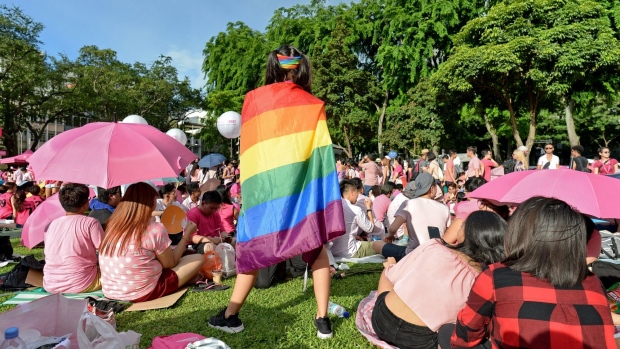Aug 22, 2022
Singapore Sex-Ban Repeal Comes With Big Hurdle for Gay Marriage
, Bloomberg News

(Bloomberg) -- Singapore Prime Minister Lee Hsien Loong said the government will repeal a colonial-era law that criminalizes sex between men, but will look to bolster rules preventing same-sex marriages by amending the nation’s Constitution.
Removing the legal ban on sex between men, known as Section 377A of the Penal Code was “the right thing to do, and something that most Singaporeans will now accept,” Lee said in his National Day Rally address on Sunday.
While the long-awaited change was welcomed by the lesbian, gay, bisexual, transgender and queer community, Lee said the city-state would alter the Constitution to protect the definition of marriage as being between a man and a woman, in a compromise with conservative and religious groups.
“We need to find the right way to reconcile and accommodate both the traditional mores of our society, and the aspiration of gay Singaporeans to be respected and accepted,” Lee said.
There will be no referendum to reconsider the decision as that requires a “very high” bar, such as issues involving sovereignty, Deputy Prime Minister Lawrence Wong said in an interview with CNA on Monday.
Any change to Singapore’s family-centric policies or its definition of marriage “will not happen under the watch of the current Prime Minister,” Wong, who’s slated to become the next prime minister, said in the interview. He added, “and it will not happen under my watch if ... PAP were to win the next General Election,” referring to the ruling People’s Action Party.
Abolishing 377A may help Singapore become more welcoming for gay tourists and companies that actively support LGBTQ causes, but the limit on marriage equality will continue to complicate matters for firms seeking to obtain visas for same-sex partners. Singapore has previously handled such requests on a case-by-case basis.
“This is a very significant signal, though it’s not nearly as far as some of us in the community hoped for,” said Darius Cheung, founder and chief executive officer of property portal 99.co. “From a global perspective, this is extremely positive for business and talent, as 377A has been one of the antiquated laws that alienates talent and makes Singapore appear behind the times.”
Read More: Singapore Ups Ante for Top Global Talent
Scott Beaumont, president of Google Asia Pacific, said he was pleased to see the repeal of the law. “We want to create an environment internally where everyone has an equal opportunity to succeed and thrive, and we’re always glad to see examples where that’s furthered externally,” he said.
In its joint statement following Lee’s speech, the LGBTQ community called the repeal of 377A “a win for humanity,” but said the intention to enshrine the nation’s current definition of marriage into the constitution “will undermine the secular character of our Constitution, codify further discrimination into supreme law, and tie the hands of future Parliaments.”
Legal Challenges
By altering the Constitution, the government may be looking to discourage legal challenges to the definition of marriage. Over the years, activists mounted a series of unsuccessful lawsuits against the ban on sex between men, which carries a maximum jail term of two years.
Both the Supreme Court and Law and Home Affairs Minister K. Shanmugam said that parliament, and not the courts, should decide the law, which hasn’t been enforced for over a decade and does not apply to women who have sex with other women.
“The provision is more to reduce the likelihood of any constitutional challenge succeeding and for such issues to be decided through the political process,” said Eugene Tan, a political analyst and law professor at Singapore Management University. “The issue remains sensitive and potent.”
One option for marriage-equality activists would be a public petition to parliament, similar to a 2007 petition to repeal the law against sex between men.
The government will make clear in the constitution that it is parliament’s prerogative to define marriage as being between a man and a woman and to make other pro-family policies on that basis, Home Affairs and Law Minister K. Shanmugam told the Straits Times Monday.
While Singapore is among 69 countries that still criminalize sex between men, other nations in Asia have been slowly moving to reduce rules that discriminate against the LGBTQ community. India’s top court legalized sex between men in 2018 and Thailand this year moved toward allowing same-sex marriages. Taiwan is the only Asian jurisdiction that legally recognizes such unions.
Hong Kong allows gay expatriate workers to bring in their partners on dependent visas following a 2018 court ruling. Though a crackdown on social activism there could hamper further legal challenges to promote equality.
In a combined response to Lee’s speech, the National Council of Churches of Singapore, a Christian coalition, said in a statement that they appreciate the assurance that the government “will uphold and safeguard the institution of marriage,” and asked it to “directly express a definition of marriage in the Constitution.”
Singapore has a vibrant LGBTQ community and hosts an annual pride rally that returned this year after pandemic restrictions eased. Apple Inc., Barclays Plc, Bloomberg LP, Goldman Sachs Group, Google and Twitter Inc. were among sponsors of the 2016 event, before Singapore tightened rules on international companies’ participation and barred foreigners from the event.
Nearly half of respondents in the city-state were more accepting of same-sex relationships than they were three years ago, according to an Ipsos study published in June, Those who supported 377A fell to 44%, from 55% in 2018, the survey showed.
(Adds deputy prime minister’s comments in fifth and sixth paragraphs.)
©2022 Bloomberg L.P.








